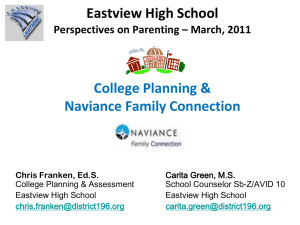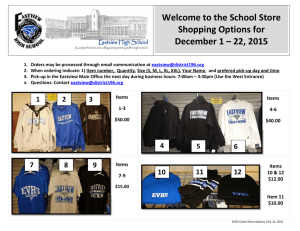College Planning For Grades 9-11 Perspectives on Parenting Eastview High School
advertisement

Perspectives on Parenting Eastview High School March, 2009 College Planning For Grades 9-11 1 Preparing students for college & careers doesn’t occur at a single point in time... Instead, readiness is a process that needs to occur over a number of years—a process that must be well under way by the middle school years, if not earlier. 2 “There is in every child… … a miracle unfolding.” Eric Erikson 3 Engage in Self Reflection • Recognize strengths and weaknesses • Analyze interests and values • Prepare for a career and expand learning • Extracurricular activities and social life • Influence of family and friends • Consider personal goals 4 Life after high school… Where do you want to be? 5 Post High School Options • Community College • Technical School • Private Business School • Military • Employment • Volunteer Work • 4 year college (private or public) 6 How College Is Different from High School • College is the first place where we expect young people to be adults. • The pupil-teacher relationship changes dramatically. • Expectations for engagement, independent work, motivation, and intellectual development also change. • College instructors pace their courses more rapidly, emphasize different aspects of material taught, and have very different goals for their courses. 7 An Operational Definition of College Readiness The level of preparation a student needs in order to enroll and succeed—without remediation—in a credit-bearing general education course at a postsecondary institution that offers a baccalaureate degree or transfer to a baccalaureate program. Conley, D. T. (2007). Toward a more comprehensive conception of college readiness. Eugene, OR: Educational Policy Improvement Center. 8 What Students Can Do to Develop Their College Readiness Students need: • to understand what it really means to be college-ready. • to understand what they must do as well as what the system requires or expects of them. • to understand that college admission is a reasonable and realistic goal that can be attained through planning and diligent attention to necessary tasks. 9 Students Also Need… • to construct an overall plan for college preparation that ensures they will develop the necessary skills in a progressively more complex fashion over four years. 10 Eastview High School Graduation Requirements English - 4 years Social Studies - 4 years Math – 3 years Science – 3 years Physical Ed. - 5 quarters Wellness - 3 quarters Grade 10 & 11 Pass Reading, Math & Writing Basic Standards Tests. Grade 9 Pass MCA Grad Tests in Writing, Math, Reading and Science • Arts – one quarter course in visual arts, music, theatre, dance or interior design, advertising • • • • • • • • 11 Course Titles and Grade Point Averages Adelman (2006) employed transcript analysis to reach the conclusion that completing a challenging high school curriculum is the greatest pre-collegiate indicator of bachelor’s degree completion. The nature and quality of the courses students take are ultimately what matters. 12 What do colleges look for? Primary Measures – Rigor of Courses – GPA/Class Rank – ACT/SAT scores Secondary Measures – – – – – Application Essay Recommendations School Activities Interview Community Service 13 Admissions Requirements Technical & Community College • English – 4 years • Social Studies – 4years • Math - 3 years • Science- 3 years • No ACT Required 14 Admissions Requirements Traditional 4 Year College & Universities English- 4 years Social Studies- 4 years Math - 3 years (minimum level of Algebra II) Science- 3 years (minimum level - Chemistry) Foreign Language - 2 or more years Fine Arts - one year of fine or performing arts NCAA qualifications ACT or SAT generally required 15 Admissions Requirements: Selective Colleges & Universities English- 4 years Social Studies- 4 years Math- 4 years Science- 4 years Foreign Language - 3 years or more Fine Arts - one year of fine or performing arts Honors and Advanced Placement classes upon recommendation • Prefer 70th percentile and higher • ACT or SAT generally required – some may require SAT Subject Tests • • • • • • • 16 Tests…tests…tests… • Beyond using HS course titles to define college readiness, a more direct approach is to test a set of knowledge that students are presumed to need to know to succeed in college entry-level courses. (ACT/SAT) • Some colleges also rely on Advanced Placement (AP) test scores as a potential measure of college readiness. • All states have adopted some form of high school examination in English, math and science for a variety of reasons including requirements in the federal No Child Left Behind Act. MCA-II’s are not included on transcripts. 17 ACT Readiness Benchmarks for Entry-level College Courses Students who meet a Benchmark on EXPLORE or PLAN are likely to have approximately this same chance of earning such a grade in the corresponding college course(s) by the time they graduate high school. ACT’s College Readiness Benchmarks are the minimum ACT test scores required for students to have a high probability of success in credit-bearing college courses—English Composition, Social Sciences courses, College Algebra, or Biology. 18 Pre-College Testing Considerations ACT PLAN Test (taken by all 10th graders) 19 ACT Readiness Benchmarks for Entry-level College Courses English Algebra Social Sciences Biology EXPLORE PLAN ACT 1-28 (gr. 8) 1-32 (gr. 10) 1-36 (gr.11) 13 17 15 15 19 17 18 22 21 20 21 24 20 ACT or SAT? (Junior Year) ACT SAT • Achievement test • Measures English, Math, Science and Reading • Scores can range from 1 – 36 • Optional Writing Test • Aptitude test • Measures Critical Reading, Math and Writing • Scores range from 200 – 800 each section • Optional Subject Tests 21 Upcoming ACT/SAT Dates: ACT: • April 4 • June 13 • September 12 SAT: • • • • March 14 May 2 June 6 October 22 EVHS ACT Prep Course 23 Family Connection by Naviance Log into Eastview’s Family Connection through the Academic Information & Planning Link at the EVHS home page or go to: http://workspacek12.naviance.com/evhs 24 Create an Account with an E-mail & Password 25 Welcome to Your Home Page! 26 My Game Plan: Goals & College Interests 27 Factors to consider when choosing a college... Cost College Characteristics Social Life Financial Aid Admissions Requirements • Academics • Student Population • Location • • • • • 28 College Search Family Connection – Advanced College Search Princeton Review – Counselor-O-Matic U.S. Dept. of Ed. – College Navigator (Check for additional college search resources on Family Connection) 29 Scheduled College Rep Visits on Family Connection 30 Checklist for a campus visit • Meet with an Admissions Counselor • Verify Admissions Requirements and major deadlines (applications, financial aid) • Take a campus tour and attend a class • Investigate your academic program • Determine actual college costs • Talk with students and faculty • Discuss your chance for admission 31 District 196 College Fair: March 18, 4-7 p.m. Approximately 100 public and private colleges and universities, community and technical colleges, proprietary schools & military organizations will be represented. College Panel Presentation from 7-8 p.m. Participating colleges, trade, career schools and military organizations can be found on the website for MACAC at www.mn-acac.org. Go to “College Fairs”, then “For Students & Parents”. Admission to the college fair is free! 32 College Costs Average annual tuition & fees: • Private Colleges: $25,237 • University of Minnesota: $10,084 • State Universities: $6,175 • MNSCU 2-Year Community, and Technical Colleges: $4,432 33 Costs and Financial Aid • FAFSA: Free Application for Federal Student Aid • Reciprocity: in-state tuition vs. out-of-state 34 FAFSA Determines Your Expected family contribution Cost of the School minus the EFC = FINANCIAL NEED 35 Eligibility Comparison Public Public Private 4-Year $15,000 - $ 5,000 2-Year $ 7,000 - $ 5,000 4-Year $25,000 - $ 5,000 Need of: Need of: Need of: $ 10,000 $ 2,000 $20,000 The Expected Family Contribution remains the same! 36 Financial Aid Package •Loans •Grants •Scholarships •Work Study 37 “Financing Education Beyond High School” An Introduction to Financial Aid Plan to attend the Eastview High School Perspectives on Parenting session on Financial Aid next January, 2010 38 Scholarship list/booklet on family Connection 39 School/Community Scholarships Eastview Community Foundation Eastview Senior Scholarship Eagan Foundation Scholarship 40 Summary of Resources: College/Career Planning • Guidance Counselors • Family Connection by Naviance • EVHS Career Center • Internet Resources • College Representatives • Campus Visits 41 42 Eastview Counselors Chris Franken – Director of Guidance Mary Hanson – A-D Mark Wanous – E-J Terri Greener – K-L Anne Scholen – M-R Julie Endersbe – S-Z 43 44

